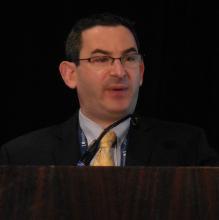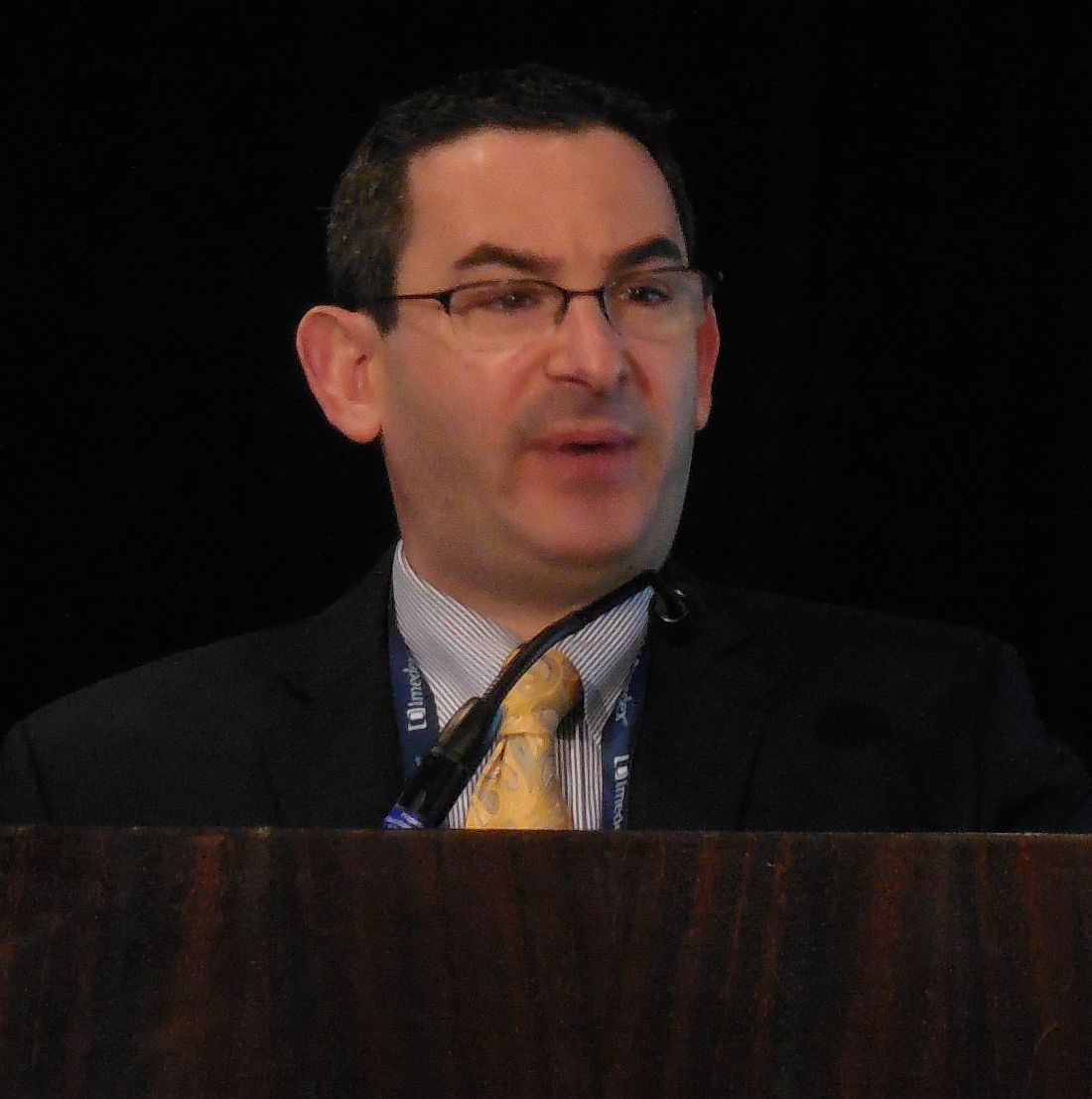User login
NEW YORK – Should the first chimeric antigen receptor (CAR) T-cell treatment receive Food and Drug Administration approval for refractory, aggressive non-Hodgkin lymphoma, possibly before the end of 2017, several thousand U.S. patients will be potential candidates for the treatment, Jeremy S. Abramson, MD, predicted at a conference held by Imedex.
Dr. Abramson has led studies using a CAR T cell that differs from the one furthest along in development. He based his predicted timetable for an approved biologics license of the process, with which he can engineer patient-specific T cells that are under development by Kite Pharma, on the “remarkable” level of complete responses the intervention produced in a pivotal phase II study.
“Seeing a complete response rate of close to 40% that is sustained for more than 3 months and a complete response rate of close to a third at 6 months is light years beyond what is now available for patients” with these chemotherapy refractory B-cell lymphomas, said Dr. Abramson, clinical director of the Center for Lymphoma at Massachusetts General Hospital in Boston. “This is the first treatment to show a significant impact on large B-cell lymphoma, and that makes me optimistic” that the FDA will grant license approval later in 2017, he said in an interview.
Dr. Abramson acknowledged that some patients developed grade 3 or 4 cytokine-release syndrome and neurologic events, but the events were reversible and manageable if treated with the immunosuppressant tocilizumab (Actemra) or a corticosteroid.
At the end of March, Kite reported the completion of its FDA application, and, on April 2, the ZUMA-1 investigators presented an updated report on their results, with a 36% complete response rate across all enrolled patients at 6 month follow-up and a 39% complete response rate in all patients out to a median follow-up of 8.7 months.
Annually, in U.S. practice, perhaps 3,000 new patients with diffuse large B-cell lymphoma would meet the enrollment criteria for ZUMA-1, Dr. Abramson estimated. Once axicabtagene ciloleucel becomes commercially available in the United States, several thousand U.S. patients might initially seek the treatment.
Dr. Abramson has been a consultant to Kite Pharma and to AbbVie, Genentech, Gilead, and Seattle Genetics.
[email protected]
On Twitter @mitchelzoler
NEW YORK – Should the first chimeric antigen receptor (CAR) T-cell treatment receive Food and Drug Administration approval for refractory, aggressive non-Hodgkin lymphoma, possibly before the end of 2017, several thousand U.S. patients will be potential candidates for the treatment, Jeremy S. Abramson, MD, predicted at a conference held by Imedex.
Dr. Abramson has led studies using a CAR T cell that differs from the one furthest along in development. He based his predicted timetable for an approved biologics license of the process, with which he can engineer patient-specific T cells that are under development by Kite Pharma, on the “remarkable” level of complete responses the intervention produced in a pivotal phase II study.
“Seeing a complete response rate of close to 40% that is sustained for more than 3 months and a complete response rate of close to a third at 6 months is light years beyond what is now available for patients” with these chemotherapy refractory B-cell lymphomas, said Dr. Abramson, clinical director of the Center for Lymphoma at Massachusetts General Hospital in Boston. “This is the first treatment to show a significant impact on large B-cell lymphoma, and that makes me optimistic” that the FDA will grant license approval later in 2017, he said in an interview.
Dr. Abramson acknowledged that some patients developed grade 3 or 4 cytokine-release syndrome and neurologic events, but the events were reversible and manageable if treated with the immunosuppressant tocilizumab (Actemra) or a corticosteroid.
At the end of March, Kite reported the completion of its FDA application, and, on April 2, the ZUMA-1 investigators presented an updated report on their results, with a 36% complete response rate across all enrolled patients at 6 month follow-up and a 39% complete response rate in all patients out to a median follow-up of 8.7 months.
Annually, in U.S. practice, perhaps 3,000 new patients with diffuse large B-cell lymphoma would meet the enrollment criteria for ZUMA-1, Dr. Abramson estimated. Once axicabtagene ciloleucel becomes commercially available in the United States, several thousand U.S. patients might initially seek the treatment.
Dr. Abramson has been a consultant to Kite Pharma and to AbbVie, Genentech, Gilead, and Seattle Genetics.
[email protected]
On Twitter @mitchelzoler
NEW YORK – Should the first chimeric antigen receptor (CAR) T-cell treatment receive Food and Drug Administration approval for refractory, aggressive non-Hodgkin lymphoma, possibly before the end of 2017, several thousand U.S. patients will be potential candidates for the treatment, Jeremy S. Abramson, MD, predicted at a conference held by Imedex.
Dr. Abramson has led studies using a CAR T cell that differs from the one furthest along in development. He based his predicted timetable for an approved biologics license of the process, with which he can engineer patient-specific T cells that are under development by Kite Pharma, on the “remarkable” level of complete responses the intervention produced in a pivotal phase II study.
“Seeing a complete response rate of close to 40% that is sustained for more than 3 months and a complete response rate of close to a third at 6 months is light years beyond what is now available for patients” with these chemotherapy refractory B-cell lymphomas, said Dr. Abramson, clinical director of the Center for Lymphoma at Massachusetts General Hospital in Boston. “This is the first treatment to show a significant impact on large B-cell lymphoma, and that makes me optimistic” that the FDA will grant license approval later in 2017, he said in an interview.
Dr. Abramson acknowledged that some patients developed grade 3 or 4 cytokine-release syndrome and neurologic events, but the events were reversible and manageable if treated with the immunosuppressant tocilizumab (Actemra) or a corticosteroid.
At the end of March, Kite reported the completion of its FDA application, and, on April 2, the ZUMA-1 investigators presented an updated report on their results, with a 36% complete response rate across all enrolled patients at 6 month follow-up and a 39% complete response rate in all patients out to a median follow-up of 8.7 months.
Annually, in U.S. practice, perhaps 3,000 new patients with diffuse large B-cell lymphoma would meet the enrollment criteria for ZUMA-1, Dr. Abramson estimated. Once axicabtagene ciloleucel becomes commercially available in the United States, several thousand U.S. patients might initially seek the treatment.
Dr. Abramson has been a consultant to Kite Pharma and to AbbVie, Genentech, Gilead, and Seattle Genetics.
[email protected]
On Twitter @mitchelzoler
EXPERT ANALYSIS FROM A MEETING ON HEMATOLOGIC MALIGNANCIES

